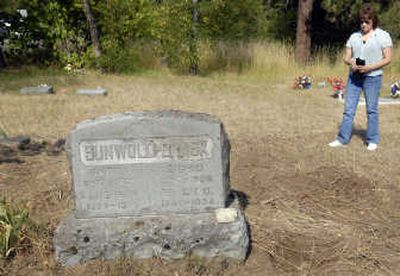Not even yucca are safe at cemetery

By now the dead in Chester Cemetery should be used to not resting in peace.
Land developers leave calling cards with the cemetery board secretary just in case anyone’s interested in subdividing. There’s a three-month-old gash in the south fence from an out-of-control motorcycle and a mound where two boys snuck in and buried a puppy directly on top of a child’s grave.
This is where Ma Bell, before being euthanized in 1982 by the federal government for running a communications monopoly, sought to locate its AT&T switchboard equipment. And so on and so forth, as everybody from county road engineers to radio station owners thought up ways to make the forebears of a forgotten Spokane Valley community roll over.
The graveyard, built on a desolate 6 acres for which no one had use in 1901, is surrounded by the Ponderosa subdivision, a sprawling, piney neighborhood of upper-middle-class homes in southwest Spokane Valley.
The most recent assault on the burial ground came last week when someone wielding a sharp spade dug up the yucca plants embellishing the graves of two Chester families, the Sunwolds and Brasks. The plants were bushes, really, an 8-foot-long hedgerow of tough, sword-shaped leaves standing almost waist high. At the time they were cut down, the plants sported milky white flowers reaching more than 5 feet high.
“It just upsets me because they were so big, and so old, 50 years or more,” said Wendy Johnson, cemetery president.
When Johnson and cemetery Secretary Sally Gerimonte surveyed the burial ground midweek, they found six divots where amputated yucca roots as big around as broom handles poked through the sand. Giant red ants that lived beneath the bushes swarmed in the heat. There was an empty Keystone Light tallboy resting on a neighboring plot.
Yucca was a plant of choice for pioneers because it lives forever without water or love. Its blue-green spears remain sharp long after surviving relatives have aged, died or moved on and no one is left to honor the dead. It is as eternal as sagebrush, which is probably the permanence the Brasks and Sunwolds sought, believing Chester Cemetery was their address for the ever after.
They were immigrants from the other side of the world and probably desired some lasting record of their final whereabouts. Cemetery records show that Gerty Sunwold, dead from stomach cancer in 1925, and Sigrid Brask, liver cancer in 1926, were sisters born in the 1850s in Gaol, Norway. Gerty married Norwegian Andrew Sunwold (liver cancer, 1938). Sigrid wed a Swede, Peter O. Brask (acute nephritis, 1934). The couples settled in Spokane County.
Not much else remains, at least nothing printed in English. Robert Brask, Sigrid and Peter’s grandson, keeps a paper trail of their early lives in a small manila envelope. There’s a document identifying his grandfather as a rifleman in the Swedish Army and long letters in which only his grandmother’s name seems identifiable.
Robert Brask, 85, no longer makes it to the cemetery much. He does revisit his memory of his grandfather, Peter, who spoke an English-Swedish parlance of his own making. As the story goes, Peter O. Brask drove a wagonload of firewood through Chester once a month en route to market and a stop at Schimmel’s Tavern. It is a favorite story of Robert’s. Robert Brask, too, suspects that the yucca plants over his grandparents’ graves were chosen because they’d last.
The Chester Cemetery was founded by farmers who could spare no good soil or water for the cause. The burial ground is blanketed in coarse sand that retains water with all the resistance of a tired screen door. It radiates heat with near-asphalt intensity.
There was a time when families would haul water in buckets to the graves after filling up at Chester Store a few blocks north. Gerimonte remembered cemetery visitors working the spigot at Chester School, but the school was torn down in the 1950s, its well abandoned. No one has stopped by the Chester Store to fill a bucket in decades.
Staring down at the holes cut in the cemetery sand last week, Wendy Johnson attempted to sugar her sour mood.
“We can only hope,” she said, “that when they took the plants, they took some red ants with them.”